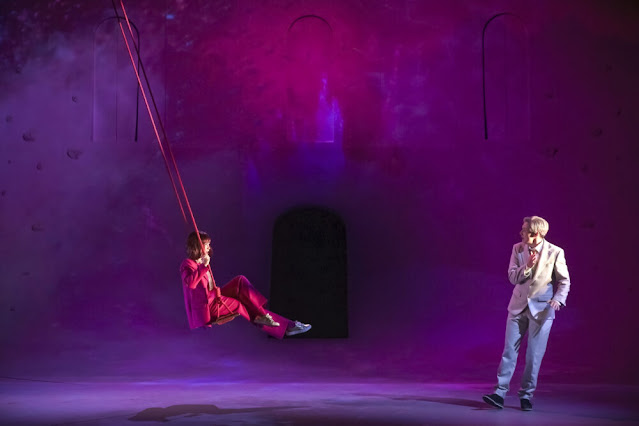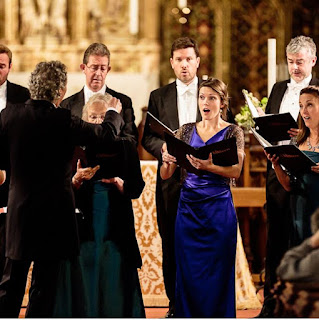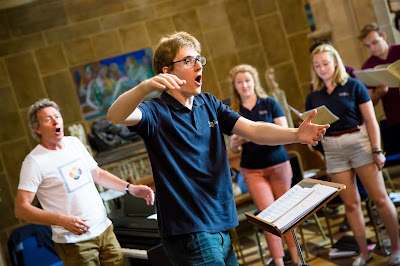 |
| Cannons House, Middlesex, where Handel's Acis and Galatea was premiered |
Handel's Acis and Galatea was premiered in 1718, though his involvement with the story of Acis, Galatea and Polyphemus dates back to 1708, and he would continue to produce versions of Acis and Galatea right up to 1741. It is one of the few works by Handel to remain consistently in the repertory, though the version that came down to us is based on Handel's later versions of the piece from the 1730s, using four soloists, chorus and orchestra, and it is only relatively recently that groups have started to consistently explore Handel's 1718 original, which uses five singers (soprano, three tenors and a bass, no chorus) and a minimum of seven instrumentalists.
Harry Christophers and The Sixteen have already performed
and recorded the 1718 version, and this month they return to it with a short tour taking in London (Cadogan Hall, 11/2/2020), Chichester Cathedral (12/2/2020), Derby Cathedral (14/2/2020), Warwick (St Mary's Church, 15/2/2020), with Grace Davidson as Galatea, Jeremy Budd as Acis, Mark Dobell as Damon, Simon Berridge as Coridon and Stuart Young Polyphemus plus an instrumental ensemble of nine. Thus giving us a chance to hear the work close to what Handel originally intended.
During Handel's early years in London (he travelled there in 1710 and decided to stay in 1712) he was very dependent on aristocratic patronage, as he had been in Italy. Italian opera was slow to take off; there were five years when Handel wrote no opera and it was only with the forming of the Royal Academy of Music in 1719 that Handel was able to devote himself, again, to Italian opera.
During the period 1717 to 1718 Handel became the house composer for the Duke of Chandos, James Brydges who had made a fortune through his public offices, though his speculations led to the loss of much of his fortune in the South Sea Bubble crisis of 1720. His grand house at Cannons in Middlesex was built between 1713 and 1724, and it was there that Handel spent a profitable and highly creative period, writing the
Chandos Anthems,
Esther and
Acis and Galatea.
Both
Esther (a masque based on a Biblical story) and
Acis and Galatea (a pastoral based on Ovid) were somewhat experimental pieces. Designed to be performed by the Duke's in-house musicians (hence the limited forces), they could both be seen as serenatas but Handel's later expansions of the works moved
Esther closer to oratorio and
Acis and Galatea towards opera.
The libretto of
Acis and Galatea has its basis in work by John Gay, but there are probably other hands in it too. The piece is heavily influenced by the English masque and pastoral tradition. The big difference between it and Continental models is perhaps the significant role allocated to the chorus (at the 1718 performance, sung by the soloists). We don't know much about this first performance, though it is reputed to have taken place on the terrace at Cannons.
Handel had, in fact, written an Italian serenata
Aci, Galatea e Polifemo in 1708 for performance at a wedding in Naples in 1708, but unusually for Handel the 1708 and the 1718 works have no music in common. After 1718, both
Acis and Galatea and
Esther languished; that the Duke lost a lot of money might have had something to do with it, and also the works were a long way from the Italian operas that Handel devoted the 1720s to.
But in 1731, someone put on a staged version of
Acis and Galatea in London. Handel wasn't involved, clearly one of the others from the first performance had kept their score. Handel was enraged, and as there was no copyright protection his only recourse was to produce a new and improved version. So the 1732 version of
Acis and Galatea was born, a polyglot piece which used Italian opera stars and wove in music from the 1708 Italian serenata. Handel would produce versions of this right through to 1741. But in 1739 he produced a two-act version of the English original and it is on this that most later performances are based.
Interestingly, Handel seems to have made no effort to stage it, despite the fact that the 1731 staging was very popular (more popular than Handel's subsequent re-working). The same is true of Handel's
Semele which we now see as an English opera, but which Handel firmly placed in the oratorio category and gave in concert.
Full details of The Sixteen's tour of Handel's 1718 version of
Acis and Galatea from
The Sixteen's website.


.jpg)























.jpg)

.jpeg)





.jpeg)